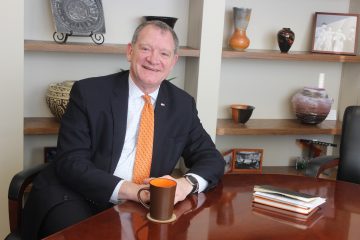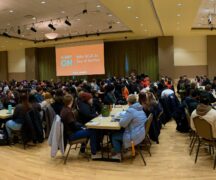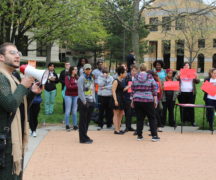By DAVID DUPONT
BG Independent News
The night before Interim President Rodney Rogers sat down with BG Independent News for an interview, he had given an introduction to a Beyond the Dream performance honoring Dr. Martin Luther King Jr.

Dr. Rodney Rogers
Preparing his remarks gave Rogers the chance to reacquaint himself with the words of Dr. King. He was struck that at the end of his life Dr. King said he wanted to be remembered as someone who “lived a committed life.”
That’s what Rogers, who assumed the presidency of Bowling Green State University on Jan. 1, hopes for those who come to study at the university.
“We want to help students think about what is a committed life,” he said. A career is part of that. “But there are other parts to one’s life. In a democratic society, it’s important we have committed citizens.”
Helping to shape “an educated and knowledgeable citizenry that can sustain a democratic society” is part of the mission of a public university.
It is why education remains important, Rogers said.
In some circles, it’s become fashionable to question the value of higher education.
Higher education is about more than the student landing that first job after earning a degree, though that’s important. “We’re not serving their needs if we’re not thinking about all those future careers,” he said.
“I think we’ve been a little lax in higher education in not reminding the public that they have placed their trust in us as public institution to educate the citizenry of tomorrow.”
Those citizens will be faced with dealing with an enormous amount of data and technology both on the job and off, Rogers said.
Rogers, who was provost, stepped into the interim role leading the university when President Mary Ellen Mazey stepped aside late last year in a move that surprised many.
“The board has asked me to make sure we continue to build on the progress that President Mazey, and others before her, established,” he said “We have so many positive things going on. I just want to make sure that’s our focus.”
He said because Mazey involved him in strategic discussions over the years, he feels prepared to maintain the progress.
He’ll have assistance from veteran and familiar faces.
Stepping in as acting provost is John Fischer, who had been vice provost for academic affairs. Rogers said he and Fischer had worked closely together on many academic initiatives. Stepping into Fischer’s job will be Sheila Roberts, who had been associate dean of the College of Arts and Sciences.
Their experience will help with the university’s continued efforts to fine tune its curriculum, recruit a well-prepared students, and seeing them through to graduation.
“The piece we need to make more progress on is serving what we call non-traditional students,” Rogers said.
There are working adults, who may need more education to further their careers, are considering changing careers or “just want more education because they’re curious.”
Reaching these students takes a variety of approaches – online courses, courses that blend face-to-face instruction with online instruction, and evening classes as well as programs “where individuals can move forward in their lives and their careers because of education,” Rogers said.
“That’s a piece we probably haven’t served as well. As a public, comprehensive university, that’s something we owe to citizens.”
Rogers also takes charge of a campus in the midst of a facelift. Coincidentally the next large-scale project on the docket is the transformation of Hanna Hall into the Maurer Center, the new home of the College of Business. Preliminary utility work is already underway with occupancy scheduled for fall, 2020.
Rogers first arrived at BGSU in 2006 as the dean of the College of Business. He said when he arrived it was clear something had to be done to update the facilities, not just to compete with other colleges but to align with the curriculum and innovative, active teaching methods.
The project will maintain the classic look on the west side to coordinate with the newly refurbished University and Moseley halls. While that will represent the past, the extension to the east will represent the future, he said.
Part of that future is a renovation of the main College of Technology, Architecture and Applied Engineering building, which houses the engineering and visual communications programs. Along with the facilities for the School of Built Environment and the Falcon Flight Center across East Poe Road, the college will have its own “little campus” on the north side.
That project is in the initial stages.
The college will also be getting a new permanent dean. Venu Dasigi has served as interim dean for several years. A search for a permanent dean is underway.
Rogers said that changes in the college under Dasigi’s leadership have now made the position far more desirable than it was when he took charge as interim.
The construction on campus, Rogers said, has been realized with the help of private funding that allowed the university to stretch its state and borrowed funds.
Those private funds have become increasingly important.
In fall, BGSU launched the public phase of a $200 million capital campaign. Rogers noted there are two years and five months year to go to reach the goal.
That’s not just for buildings. The capital campaign will raise funds for scholarships, endowed professorships, and named programs.
The campaign is going well, he said, and it’s important to keep that trajectory during this period of transition.
Rogers allowed that he is interested in becoming the next president of the university. “That said, my number one job is to make sure that I focus on keeping the momentum of the institution going forward.”





